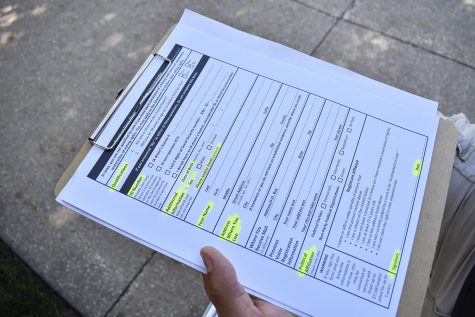Hegde: My two names — the real one, and the ‘Americanized’ one
A discussion about the ‘Americanizing’ of foreign names and the division of identity that comes with it.
October 23, 2018
Minorities living in the U.S. often have to balance two lives. There is the life you have at home, in which you are surrounded by culture ranging from homemade authentic cuisine to traditional decorations decked throughout the house. Then, there is the life outside of your home, where assimilation is the key to feeling a sense of belonging.
For many minorities in the United States, a name is the one thing that carries over between what is often a clash between their ancestral roots and American culture. This would be easy if it was as simple as that; however, people often change the pronunciation of their name to better suit those they are interacting with.
RELATED: Hegde: What’s in a name?
I don’t remember when I started having two names. I just remember that one day, when I was 5 or 6, I realized that I had a name for when I was home and when I was at school or at my activities. In my case, all that changes when pronouncing my name correctly is a slight “th” emphasis at the end of my name rather than pronouncing it the way it is spelled. While this may seem like it barely makes a change, imagine how many words wouldn’t have the same meaning if they were pronounced differently.
The conflict began when I started mispronouncing my own name — it was the bad habit that changed my life.
I thought that it made things easier; I figured that people would be less intimidated by my name if I altered the syllables to sound a little more “American.” The day that I realized the consequences of this, it was too late. I was meeting a new Indian family that had moved near my house; when introducing myself, I had a difficult time trying to say my own name the correct way. I remember feeling lost and distanced from the Indian part of myself as I couldn’t help but say my name with a pronunciation that had no meaning to me at all.
I am not the only one that feels a sense of frustration. An anonymous individual described why the constant mispronouncing of their name deeply upsets them.
“My name is from a different cultural background,” they said. “It represents everything my parents have done to become successful in this country. When it gets mispronounced, I feel disrespected, and I feel that my [parents’ success] will never matter because I will always be considered a foreigner and viewed differently just because of my name.”
Amanda Vecellio, a sophomore at the UI, said people have mispronounced her last name for her entire life, and that it bothers her because her Italian last name is a part of her identity.
“I have accepted that there will always be two versions of my name,” she said.
There is a significance in a name; the meaning of Suchaeta in Sanskrit — an ancient Indian language — is wisdom. Parents with an outside cultural background living in the United States, just like mine, put time into giving their children names that are significant to them. Is it really fair for their children to feel that they have to mispronounce their names for the comfort of others?





















